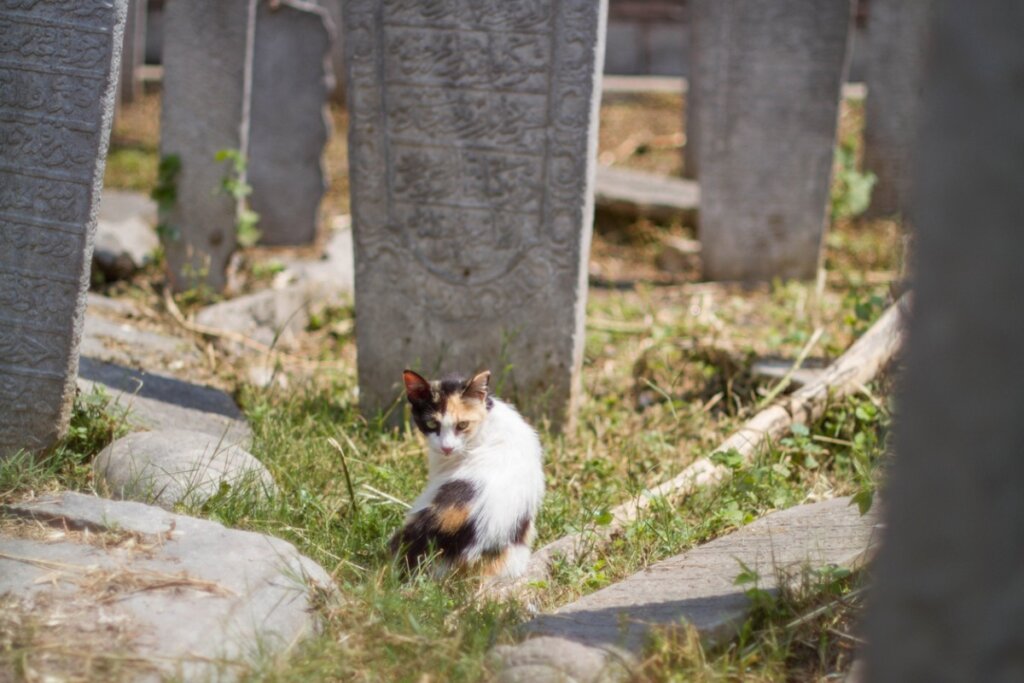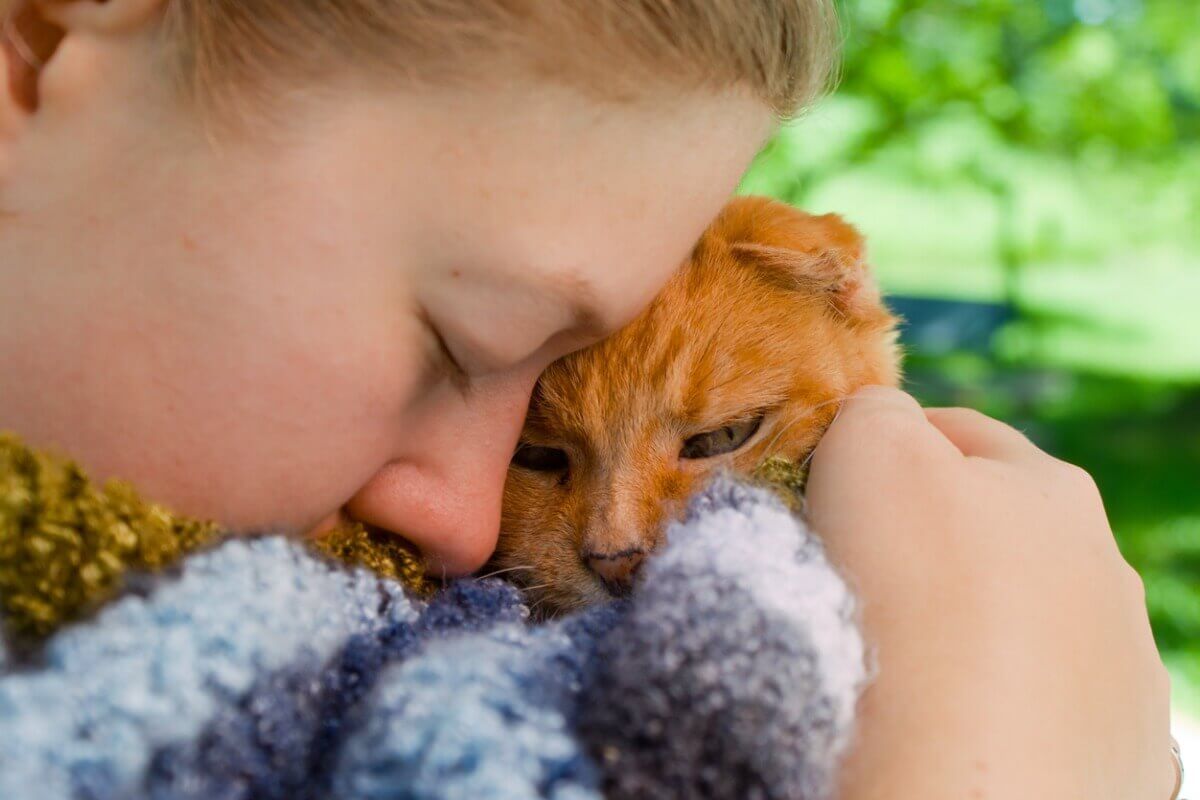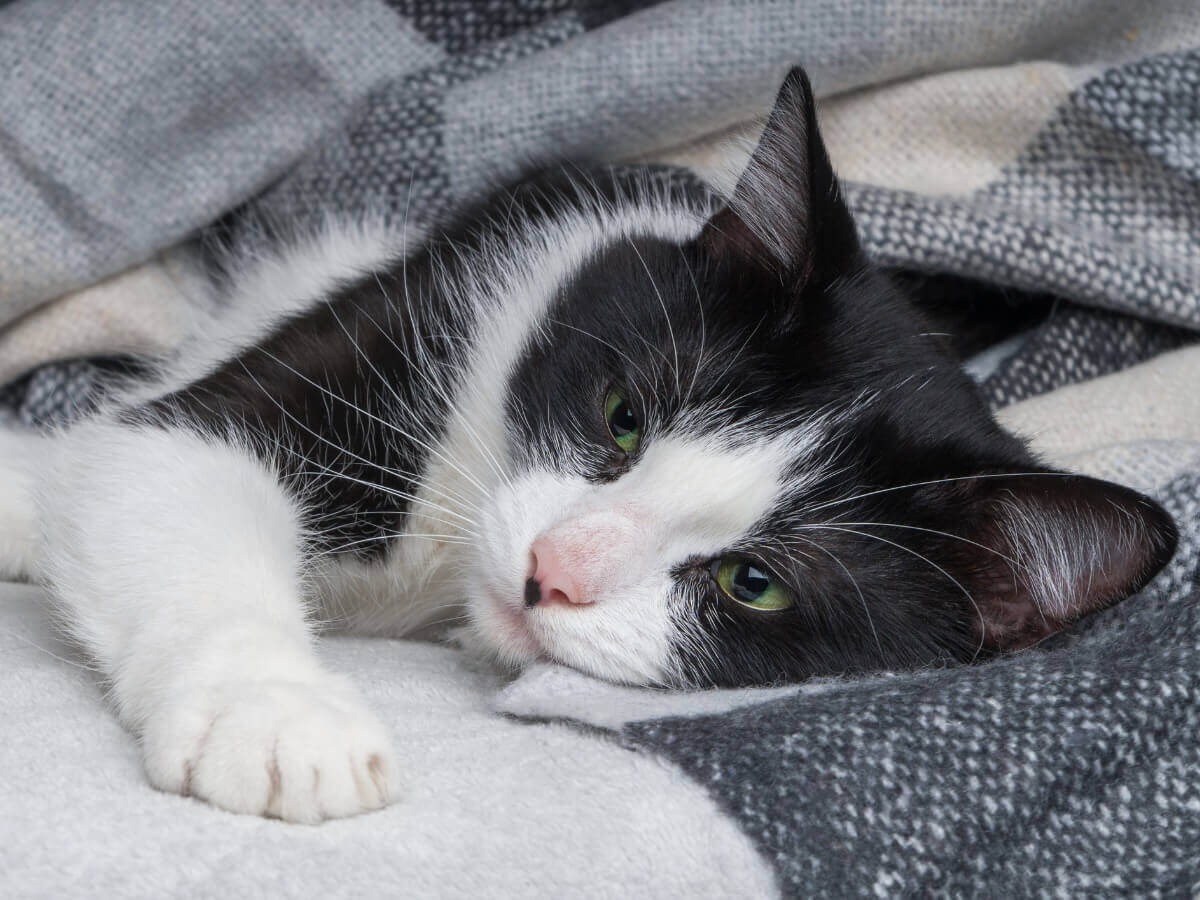12 Signs that a Cat's Going to Die

Cats live an average of 15.1 years in captivity. This is more than enough time to create memories with a feline and to come to adore it with your whole being. Therefore, no one wants to think about its absence. In any case, every guardian needs to know the signs that a cat is going to die in order to be able to say goodbye and give it the appropriate attention at the right time.
From 11 years of age, a cat is considered senior and you must pay special attention to any symptoms that appear, as it’s most likely a serious condition. Next, we’ll show you the signs that should concern you if you live with a feline at home.
1. An accelerated rate of breathing
It’s normal for a cat to breathe fast when it’s excited or has just exercised, but it’s not usual for it to show a fast rhythm at times of rest or when sleeping. The respiratory rate of this species ranges between 20 and 42 breaths per minute, and any value above this range is cause for concern if it occurs for a long time.
Rapid breathing is known as “tachypnea.” It’s usually a sign of breathing or heart problems.
2. Low body temperature
The body of a feline is at a temperature between 98.6 and 100.4 ° F in normal situations. If you notice that your pet’s cold (especially in the nose and paw pads), it may be suffering from a serious illness that doesn’t allow it to thermoregulate. This is one of the clearest symptoms that a cat’s going to die.

3. It has a lump on its body
Unfortunately, 1 in 5 cats will develop cancer in their lifetime, as reported by the Flint Animal Cancer Center. Lymphoma is the most common of all, but oral melanoma, breast cancer, and many other neoplasms also claim thousands of feline lives each year. Check your pet for lumps (especially if it’s older) to detect any tumors early.
Not all tumors are carcinogenic, but the older the cat, the more likely this latter scenario is.
4. Its breath is foul
It’s normal for a feline to have a slightly bad smell in its mouth, as it eats things that aren’t appetizing to humans. However, if its breath smells like a sewer or a dead animal, it’s most likely suffering from a serious infection or systemic failure. This isn’t always a sign that a cat’s going to die, but it does indicate an emergency veterinary situation.
5. It doesn’t groom itself
Grooming and hygiene are basic concepts in the life of a cat. They always try to be as clean as possible and hate feeling dirt on their body. For a feline to stop cleaning its fur is a very bad sign, as it goes against its instincts in every way.
A cat that isn’t groomed will have a greasy and matted coat.
6. Strange body odor
Besides bad breath, one of the clearest symptoms that a cat’s going to die is that it smells strange in general–its body as well as its mouth and secretions. This is due to the accumulation of toxins in the animal’s body, which can be exuded through saliva, feces, pee, and many other things.
7. It seeks constant solitude
This symptom is subjective and depends on the perception and knowledge of the pet’s owner. It’s not easy to explain, but the human will most likely notice when their feline wants to be alone more often than usual. The cat will hide in areas of the house you don’t often frequent, will be afraid at all times, and will avoid eye contact. In other words, they don’t want to be vulnerable.
By instinct, cats that feel very bad avoid contact to avoid being vulnerable to others.
8. Weight loss
An overly thin feline will have excessively contoured ribs, pelvis, and lumbar vertebrae. If it goes long enough without eating, the animal will visibly lose weight and its bones will become more and more apparent. This is a classic symptom that a cat’s going to die, as it’s present in almost all animals in their last stages of life.
9. Stop eating
According to professional sources, it’s normal for an elderly cat to eat less than one at the peak of its life. Senior felines exercise less and have stunted senses, so they need fewer calories and they don’t enjoy the eating process as much. Just the same, any time an animal stops eating drastically it’s a sign that something isn’t right at all.
Eating is the first sign of well-being in all living beings. Failure to do so always indicates illness.
10. Its heart rate is low
The heart rate of a healthy cat at rest is 160 to 180 beats per minute, although at times it can reach 220. If you notice that the feline is listless and, when measuring its heart rate, it’s less than 140 beats per minute, you’re likely to be dealing with a case of heart or systemic failure leading to death.
11. It has trouble using your litter box
As we’ve already mentioned, felines are very hygienic and routine animals that enjoy order in their home. If your pet has been trained to use the litter box as a kitten, it’s a bad sign when it suddenly stops doing it in its adult stage. It may have trouble controlling its bowel movements, something that almost always indicates illness.
12. The cat rests more than usual
One of the most common symptoms that a cat’s going to die is a marked reduction in its activity. A feline sleeps 12 to 16 hours a day in times of normalcy, but when it’s active, it tends to play and seek stimuli and contact with its owner. If your pet sleeps all the time and moves exceptionally little, it’s probably time to go to the emergency vet.

Accept the moment when it comes
We know it’s difficult, but sometimes the best option is to let the animal go. If your cat is very old and has several of the aforementioned symptoms, it’s most likely that its life is ending. Sometimes veterinarians seek to apply emergency treatments, but in many other cases, palliative care is chosen so that the animal suffers as little as possible.
As an owner, it’s your responsibility to accompany the animal in its last moments, no matter how much it hurts. Accompany them as they’ve accompanied you throughout your life and help it suffer as little as possible in the process. Living beings leave, but memories accompany us forever.
All cited sources were thoroughly reviewed by our team to ensure their quality, reliability, currency, and validity. The bibliography of this article was considered reliable and of academic or scientific accuracy.
- Common cancers in cats, Flint Animal Cancer Center. Recogido a 10 de septiembre en https://www.csuanimalcancercenter.org/2019/11/20/common-cancers-in-cats/#:~:text=One%20in%20five%20cats%20will,lives%20after%20a%20cancer%20diagnosis.
- Is It Time To Say Goodbye? Signs Your Pet Cat Is Dying, Pet Angel Funerals. Recogido a 10 de septiembre en https://www.petangel.com.au/is-it-time-to-say-goodbye-signs-your-pet-cat-is-dying/
- Purina Institute. (2021). FEEDING SENIOR CATS. Recodifo el 28 de agosto en: https://www.purinainstitute.com/sites/g/files/auxxlc381/files/2021-05/Feeding-Senior-Cats.pdf
